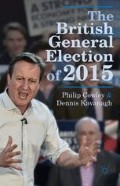Abstract
Ed Miliband was elected Labour leader on 25 September 2010.1 He defeated his older and politically more senior brother, David, on the fourth and final round of voting by a wafer-thin margin, 50.65% to 49.35%. David Miliband had led in all three earlier rounds of voting, and even in the final round led amongst both Labour MPs/MEPs and party members, but Ed Miliband’s lead amongst trades union and affiliated bodies was just sufficient for victory. Inherent in a voting system like the one used by Labour is the idea that the various components of the electoral college might differ in their preferences (if not, there is no point in having them), but the nature of Miliband’s victory thereafter allowed critics, both within and without the party, to say that he owed his victory to the unions.2
Access this chapter
Tax calculation will be finalised at checkout
Purchases are for personal use only
Preview
Unable to display preview. Download preview PDF.
Notes
Tim Bale, Five Year Mission. Oxford University Press, 2015.
Richard Jobson and Mark Wickham-Jones, ‘Reinventing the Block Vote? Trade Unions and the 2010 Labour Party Leadership Election’, British Politics, 6 (September 2011): 317–44.
See James Mitchell, ‘Sea Change in Scotland’ in Andrew Geddes and Jon Tonge (eds), Britain Votes 2015. Oxford University Press, 2015.
See also A. Convery, ‘2011 Scottish Conservative Party Leadership Election: Dilemmas for Statewide Parties in Regional Contexts’, Parliamentary Affairs, 67(2) (2014), 306–27.
Author information
Authors and Affiliations
Copyright information
© 2016 The Editor(s)
About this chapter
Cite this chapter
Cowley, P., Kavanagh, D. (2016). Brand Failure: Labour. In: The British General Election of 2015. Palgrave Macmillan, London. https://doi.org/10.1057/9781137366115_3
Download citation
DOI: https://doi.org/10.1057/9781137366115_3
Publisher Name: Palgrave Macmillan, London
Print ISBN: 978-1-137-36613-9
Online ISBN: 978-1-137-36611-5
eBook Packages: Political Science and International StudiesPolitical Science and International Studies (R0)

